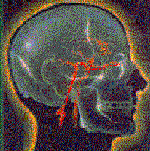



| The "cockiness of knowing" |
|
When in the course of human events, someone pops up and starts finding out things - sure there are things to find out, and some people find them out, a little bit at a time - the more that it accumulates, the more it becomes a "new sense of I", of "I know." Well, there is a "cockiness" in that, a bold or brash self-confidence, and you can feel it. It's when you start "making sense to yourself." There is also a "cockiness" in not-knowing - knowing that you know nothing. This can happen sometimes, but it is rare - like coming across someone, some writing, some information, the "truth" with which you feel you're somehow "vibrating sympathetically," while realizing, you don't have a clue what they're really talking about. It's like finding a secret, and knowing you're just about the only one yet to do so. Both are traps, of course. And many are those who succumb to their pleasures, their intellectual treasures. And if I were to start "naming names," I wouldn't be finished till way past coctail hour tomorrow. What contributes most to this "cockiness of knowing," is education, especially when it pertains to so-called "higher subjects" and comes packaged in a "work language." Whether that "work language" is very free-form (like "non-dualism-speak") or very rigid (like fourthway-speak), if you use it, in your head or in your speech, you can feel this "cockiness of knowing." That is why there is a strong suggestion, here, to avoid using any "work language" at all, to avoid forever all dogma - which simply means, all "words of others"). Of course, what you're left with, is just yourself, "being-just-a-babe-in-the-world" who really knows absolutely nothing, and who is not cocky about that, awed perhaps, amazed at times, but never cocky. |


